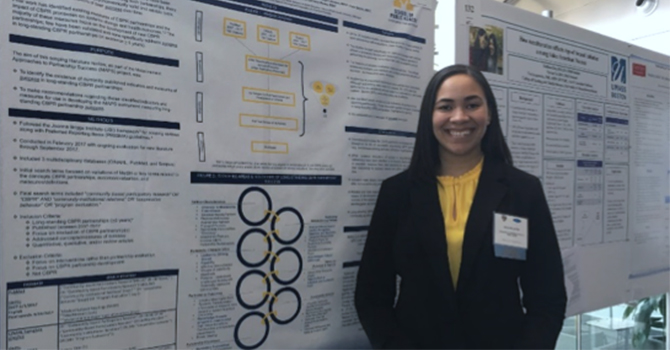Building Success in Community-Based Participatory Research Partnerships

Brianna Jacobs
MPH Candidate, Health Behavior and Health Education
During my first year as a MPH student at the University of Michigan School of Public Health, I had the opportunity to participate as a student research assistant on the Measurement Approaches to Partnership Success (MAPS) Project, an affiliated project of the Detroit Community-Academic Urban Research Center (Detroit URC). The MAPS project, a National Institute of Nursing Research (NINR), National Institutes of Health (NIH) federally funded R01, focuses on creating and validating a tool that measures the intermediate and long-term factors that contribute to success in long-standing community-based participatory research (CBPR) partnerships.
The Detroit URC, established in 1995, is itself an example of a successful, long-standing CBPR partnership. It launched the MAPS in 2016 as a five-year project aimed at creating a clear definition of success in CBPR partnerships, which would allow research groups to assess and strengthen their own partnerships. As a student, it's exciting to contribute to the development of a research tool that will have a lasting impact on future research.
Working on the MAPS project has given me the opportunity to work with Drs. Barb Brush, Barbara Israel, and Laurie Lachance, principal investigators of the MAPS project. Hailing from the University of Michigan Schools of Nursing and Public Health, these investigators have been pioneers in community-based approaches to research and evaluation. Not only have they mentored me and found ways to involve me in the project, I've learned about consensus-building and study design just by watching them work as a team.
One event that was especially meaningful to me was attending the New England Science Symposium (NESS) at the Harvard Medical School on April 8, 2018. The New England Science Symposium is a conference that provides a forum for undergraduate, post-baccalaureate, dental, graduate, and medical students, as well as post-doctoral fellows to share their research. NESS is open to students of all backgrounds, but is marketed specifically toward African American, Hispanic/Latino, and American Indian/Alaska Native students. After submitting an abstract, students were selected to present a poster or give an oral presentation. My abstract was selected for a poster presentation. This experience gave me the opportunity to promote my work as a student researcher, as well as promote the Detroit URC and its accomplishments on a national scale.
Since the public health division of the symposium was one of the smallest divisions at a conference that predominantly involved biomedical research presentations, one of the most frequently asked questions I received from individuals who viewed my poster was "What is CBPR?" This gave me the opportunity to educate fellow researchers on the benefits of applying a CBPR approach to many different types of research projects.
I was able to share what I have learned about this approach to research—specifically that CBPR equitably involves community members, organizational representatives, and academic researchers in all aspects of the research process. CBPR enables all partners to contribute their expertise, with shared responsibility and ownership; it enhances the understanding of a given phenomenon; and, it integrates the knowledge gained with action to improve the health and well-being of community members, such as through interventions and policy change (Israel, Schulz, Parker, and Becker, 1998).
Throughout the symposium, I had the opportunity to network with students and faculty from institutions all around the country, and learn more about the research others are doing in a variety of fields, such as immunology, genetics, microbiology, and engineering. Experiences like this one have been a valuable part of my experience in public health because they provide the opportunity to expand my knowledge and increase my capacity for interdisciplinary research.
----------
A special thank you to the departments and organizations who helped make this experience possible:
Detroit Community-Academic Urban Research Center
Measurement Approaches to Partnership Success Project
Department of Health Behavior and Health Education
University of Michigan School of Public Health
New England Science Symposium
Harvard Medical School
Minority Faculty Development Program of the Office of Diversity Inclusion and Community
Partnership
Biomedical Science Careers Program
National Institute of Nursing Research (NINR), National Institutes of Health (NIH)
About the Author
 Brianna Jacobs is a second year Master of Public Health student in Health Behavior
and Health Education at the University of Michigan School of Public Health. Jacobs
is an intern for the Detroit Community-Academic Urban Research Center (Detroit URC),
where her research focuses on indicators of success in long-standing community-based
participatory research (CBPR) partnerships. She hopes to apply her background and
training in CBPR to future research studying triple-negative breast cancer in African
American women. She currently serves as the 2018-2019 professional development chair
for the Public Health Students of African Descent (PHSAD) student organization. Jacobs
graduated from the University of South Carolina with a BA in public health in 2016,
and will be completing her MPH summer internship at the University of Texas MD Anderson Cancer Center in Houston.
Brianna Jacobs is a second year Master of Public Health student in Health Behavior
and Health Education at the University of Michigan School of Public Health. Jacobs
is an intern for the Detroit Community-Academic Urban Research Center (Detroit URC),
where her research focuses on indicators of success in long-standing community-based
participatory research (CBPR) partnerships. She hopes to apply her background and
training in CBPR to future research studying triple-negative breast cancer in African
American women. She currently serves as the 2018-2019 professional development chair
for the Public Health Students of African Descent (PHSAD) student organization. Jacobs
graduated from the University of South Carolina with a BA in public health in 2016,
and will be completing her MPH summer internship at the University of Texas MD Anderson Cancer Center in Houston.
